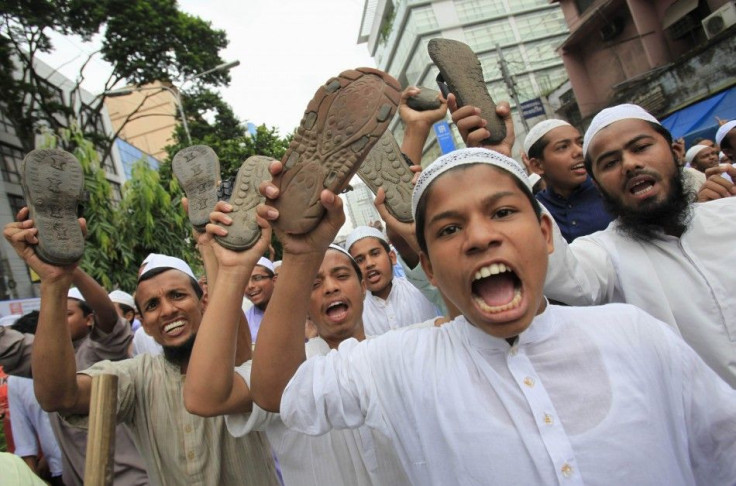At Least 14 Dead As Muslim Protests Spread To 20 Countries

There have been at least 14 deaths and hundreds of arrests across the Muslim world this week, as outraged protesters continue to march on United States missions abroad in an uproar allegedly ignited over a 14-minute anti-Islam video that denigrates the Prophet Muhammad.
The protests initially sparked in Egypt on Tuesday, spreading within hours to Libya, where U.S. Ambassador to Libya Christopher Stevens and three of his aides were killed after attackers set the U.S. Consulate in Benghazi on fire. The death toll ticked higher on Friday, when Tunisian media reported at least two protesters had been killed and 29 wounded clashing with police in Tunis.
Lebanese media reported one person had been killed in Tripoli, while Agence France-Presse reports two people lost their lives after protesters stormed past police to raise a black Islamic flag at the U.S. Embassy in Khartoum, Sudan. Meanwhile, at least five protesters were killed in Yemen in clashes around the U.S. Embassy in Sana.
And that isn't all. Muslim demonstrators, furious about the U.S.-produced low-budget video titled "The Innocence of Muslims," have also taken to the streets in more than 20 countries, including Somalia, Sudan, Bangladesh, Indonesia, Pakistan and Iraq. Clips of the film, which portrays Mohammad as a fraud, womanizer and child molester, are still available on YouTube, although they have been blocked in some countries.
About 100 people were detained for taking part in an unauthorized demonstration near the U.S. Embassy in Paris on Saturday, according to media reports. The day before, Sudanese protesters broke into the U.S. and German embassies in Khartoum and raised Islamic flags on those compounds.
U.S. Defense Secretary Leon Panetta told reporters the Pentagon has deployed forces to a number of locations in the Middle East in order "to be prepared to respond to any requests that we receive to be able to protect our personnel and our American property," according to The Associated Press.
The Pentagon dispatched elite Marine rapid response teams to Libya and Yemen to quell violence in those areas. Although it also sent a team to Khartoum, the Sudanese government reportedly objected to the deployment.
About 50 people have been arrested in connection with the deadly attack on the U.S. Consulate in Benghazi, Libyan President Mohammed Magarief told CBS News on Sunday. Magarief said the violence was planned by foreigners that are either linked to al Qaeda or sympathize with its cause.
Susan Rice, the U.S. ambassador to the United Nations, said Sunday that preliminary information indicates the Benghazi incident was a spontaneous reaction to the video, although other reports have called the uproar a pretext for a previously planned attack.
"It seems to have been hijacked, let us say, by some individual clusters of extremists who came with heavier weapons," Rice said, adding that such weaponry is easily accessible in post-revolutionary Libya.
The U.S. is investigating whether terrorist groups may have exploited the public outrage over the film in order to trigger an attack long in the works.
The State Department ordered all nonessential U.S. government workers and their families out of Sudan and Tunisia over the weekend, just as al Qaeda's most active branch in the Middle East, in Yemen, issued a call for further attacks on U.S. embassies.
The sudden turmoil overseas has become a thorn in President Barack Obama's re-election campaign, as his Republican challenger Mitt Romney attempts to link the demonstrations to Obama's leadership and foreign policy. The issue is particularly controversial in light of the U.S. support for the uprisings acrosss the region known as the "Arab Spring," which have led to Islamist governments taking over in Tunisia and Egypt.
Click here to see The Atlantic's up-to-date map of the Muslim protests erupting across the planet.
© Copyright IBTimes 2025. All rights reserved.





















